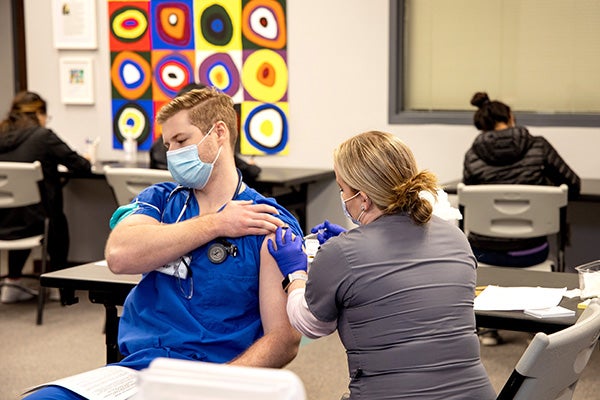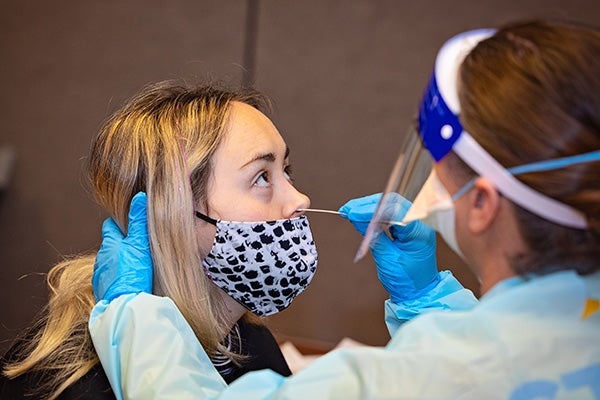COVID-19 immunity study shows natural immunity wanes quickly
Public health researchers from East Carolina University’s Brody School of Medicine, led by Suzanne Lea, have finalized their findings of the Pirates’ Prevention and COVID-19 Testing Study (PiratePACT) study of immune response to the COVID-19 virus in young adults and determined that the majority of “healthy young adults did not have long-lasting” immune response after natural infection prior to vaccination.
Findings indicated that after about four months nearly 70 percent of healthy young adults had lost their natural immunity to the virus after a detectable infection. Alternatively, those who were vaccinated showed very strong immunity to COVID-19, with immunity persisting longer than in unvaccinated participants.

East Carolina University Brody School of Medicine student James Stanton receives a COVID-19 vaccination. (ECU photo by Rhett Butler)
Antibodies created by exposure to COVID-19 are referred to as nucleocapsid proteins and were a critical aspect of the PiratePACT study.
“The nucleocapsid protein is useful for understanding recent infection, movement of infection within a community, and helps distinguish natural infection from vaccine-induced antibody responses to the spike protein,” explained Lea, a professor of public health at Brody.
The study was designed in the summer of 2020 to have half the 300 participants be freshman living in the dorms at ECU with a remainder a random sampling of other volunteer ECU students. The available pool dwindled in the face of required social distancing and health protection measures which saw most of the student body depart campus living in favor of remote learning.
“It is very hard to track students longitudinally in big groups and we were able to do that over seven months, which was one of the strengths of our study,” Lea said. “Another unique feature was tracking antibodies over time in a healthy group of young adults.”
To continue the study after the COVID-19 response took hold, participants were required to live in Pitt County and be willing to come to campus every two weeks for testing. About 140 students remained in the study and only four tested positive, which Lea chalks up to mitigation behaviors that prevented the spread of the virus.
“When people started enrolling in the study, in late August (and) early September 2020, there were several students who already had COVID and that was from the August clusters,” Lea said. “Once people really hunkered down with the mitigation behaviors, we didn’t see a lot of affection in the students that were participating in PiratePACT study.”
Eleven participants received a first dose of vaccination during January, February or March of 2021, which was prior to most young adults becoming fully eligible for vaccination.

Madison DesChenes gets tested for COVID-19 by Kristina Simeosson in Mendenhall. (ECU photo by Cliff Hollis)
Other studies, including a meta-analysis of the effectiveness of COVID-19 vaccines and natural immunity, showed similar results to the PiratePACT study, with natural immunity waning after about 140 days in that cluster of studies.
When students returned to campus in the spring, nearly all had either had been exposed to COVID-19 in some way, which Lea said resulted in observed acquired immunity.
At the time of the study, students said they elected to participate as a way to keep tabs on their exposure status and to ensure they didn’t infect vulnerable family members. Madison DesChenes, a dance major in early 2021, was on campus for dance classes and said she didn’t want to bring the virus home and potentially expose her grandmother, whom she lived with.
Study results showed the immune response rocketed up to very high levels immediately after vaccination, which study lead Lea said proved the efficacy of the COVID-19 vaccines. However for this study, immune response from vaccines was effectively moot as the distribution of vaccines was limited to health care professionals and the most vulnerable populations.
Lea says that natural immunity only holds so long and isolation and masks can be helpful, but vaccinations are the key to a rapidly mutating virus like COVID-19.
“It’s kind of like when it’s raining,” Lea said. “You don’t really want to get wet. So, you put on your galoshes and your raincoat, and you bring your umbrella because you just really want to protect all angles from the rain. If you don’t have any of them, you’re going to get totally wet.”